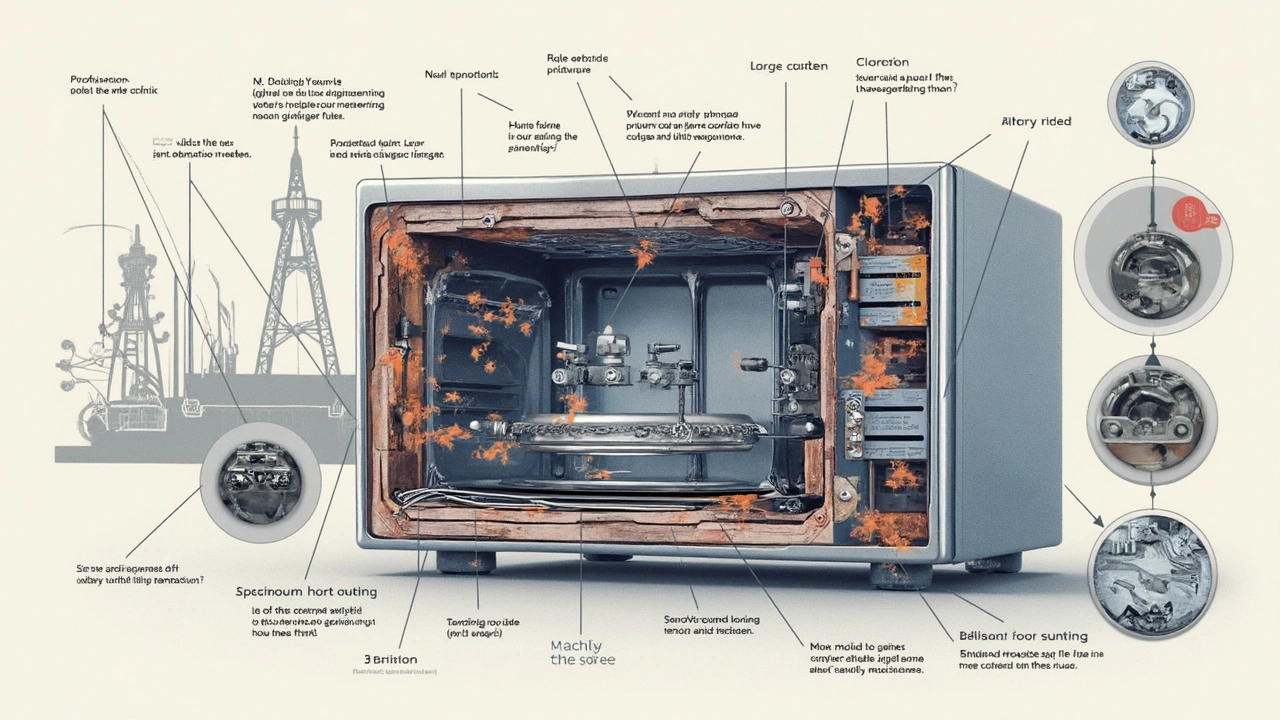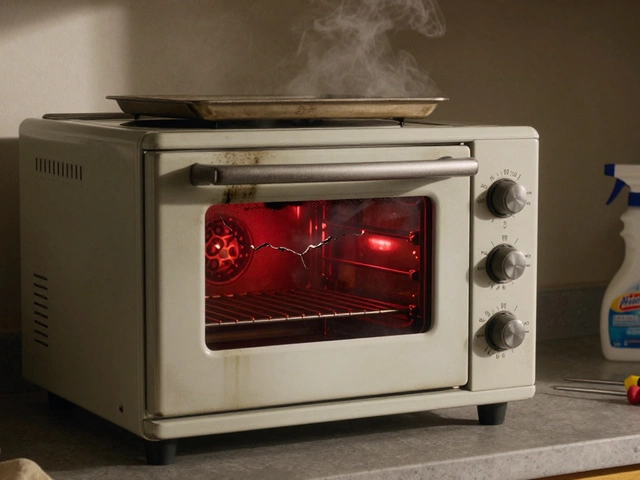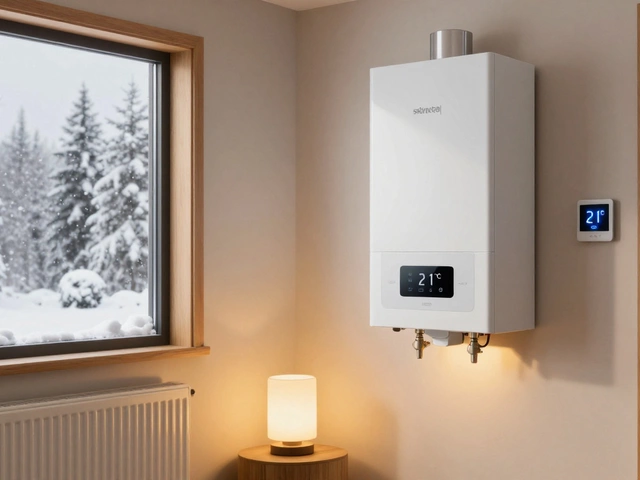Ever heard a sudden 'pop' from your microwave and wondered what's gone wrong? It's possible you've got a blown fuse. Most folks wouldn't guess how common this microwave hiccup is, yet it happens more often than you'd think. Now, before you dash out to buy a new one or call a repair service, let's break down what you're dealing with here.
First off, identifying a blown fuse is key. The signs aren't subtle—a dead microwave or one that's just not heating can scream 'fuse trouble.' The cost to fix this can float somewhere between $50 and $150, which is a good slice off buying a brand new microwave. Weighing this cost against doing it yourself could put some dollars back in your pocket, but there's also the safety side to consider when tinkering with appliances.
Stay tuned for tips on spotting fuse issues and deciding when to call in the pros or ditch things for a new start. Spoiler alert: knowing when to fold 'em is half the battle here!
- Understanding Microwave Fuse Issues
- Signs Your Microwave Fuse Is Blown
- DIY vs. Professional Repair Costs
- Tips to Prevent Future Blown Fuses
- When to Replace Instead of Repair
Understanding Microwave Fuse Issues
So what's the deal with microwave fuses, anyway? These little guys are basically the unsung heroes of your trusty kitchen appliance. They’re there to protect the microwave by cutting off the power when things go awry, like when there's a voltage surge. You don't want your microwave going all Frankenstein with too much juice!
What Exactly is a Microwave Fuse?
Think of the microwave fuse as your microwave's inbuilt security officer. Its job is to ensure everything runs smoothly and safely. When the electrical current flares up beyond normal levels, the fuse sacrifices itself to prevent damage to the more costly parts of the microwave. It's like taking one for the team.
Types of Fuses in a Microwave
Inside a microwave, you typically find ceramic fuses—tough cookies that can handle high current levels. The other type you'd come across is a glass fuse. While less common, they're nifty in appliances with lower current requirements. Knowing which type you have is handy when you’re making a trip to the store or ordering online.
How Fuses Get Blown
Got a microwave that suddenly refuses to budge? A blown microwave fuse might be the culprit. Usually, this happens due to power surges, but it can also be a sign something's gone awry in other parts of the microwave like the magnetron or door switch. If you’re seeing sparks, that’s a clue too!
Here's a quick note: Sometimes, basic wiring issues can also fry the fuse. Before jumping into conclusions or fixes, it's smart to consider consulting a pro if you notice frequent blowouts.
Spotting a Blown Fuse
How do you tell if it’s the fuse acting up? If the microwave simply won't start or heat, a fuse check might be in order. But don't just eyeball it; a volt/ohm meter will tell you if it’s got any life left in it. You’re looking for a zero reading, which points to a blown fuse. Testing fuses with a simple continuity test can save heaps of troubleshooting time.
Signs Your Microwave Fuse Is Blown
So, your microwave has decided to take an unscheduled holiday? Before blaming the power company or banging it around, there are a few classic signs that might just point to a blown fuse. Understanding these can save you a trip to the repair shop sooner than you think.
1. The Microwave Won't Start
You're pressing buttons, but it's like your microwave is ignoring you. A no-response situation often screams, "Check the fuse!" No light, no hum, no beeping—you're staring at a brick until that fuse is sorted.
2. Stops Working Mid-Cook
Did your dinner go dark before finishing its grand finale? If the appliance suddenly shuts off during use, this could mean the fuse has had enough. It's a common symptom for microwave repair cases.
3. No Heat Despite Running
Your microwave lights up like it's doing a Vegas show, but your leftovers are as cold as ever. When everything seems normal except for the lack of heating, it's a key sign the fuse is out and the heat is gone with it.
4. Weird Noises
If it starts making sounds that make you wonder if it’s about to launch into space, you might have trouble on your hands. It's a subtle hint to check the microwave fuse, among other parts.
Troubleshooting these issues can sometimes bring your microwave back to life with minimal fuss. Just make sure you're safe and sound when you decide to play detective inside an appliance; safety first, folks!
| Common Problem | Possible Reason |
|---|---|
| Microwave won't start | Blown fuse |
| Stops mid-cook | Blown fuse or power issue |
| No heat | Blown fuse or faulty magnetron |
| Weird noises | Electrical issues, possible blown fuse |

DIY vs. Professional Repair Costs
So, you're facing a blown microwave fuse and wondering whether to tackle it yourself or bring in a pro. Well, here's the scoop: both options have pros and cons, and the right choice depends on a couple of factors, like your budget, skills, and comfort level with a screwdriver.
DIY Repair: Give It a Go?
If you're a bit of a weekend warrior when it comes to fixing things, replacing a microwave fuse could be right up your alley. The parts themselves are super cheap – we're talking a few bucks. A quick trip to a hardware store or an online order will set you right.
- Cost: Around $5-$15 for the fuse.
- Tools: Basic screwdriver set and maybe some needle-nose pliers.
- Time: Typically under an hour, if you don't hit any snags.
Keep in mind, messing with electronics can zap you if you're not careful. Always unplug the microwave before starting, and if you're unsure, it might be best to ask or watch a few how-to videos. That visual guidance can make all the difference.
Professional Repair: Worth the Spend?
If DIY isn't your thing, or you're a bit wary of poking about in appliances, hiring a professional can save you some headaches. Sure, it'll cost more than doing it yourself, but you get peace of mind (and maybe even a warranty on the work).
- Cost: Generally between $50 and $150, depending on the repair shop.
- Time: Usually takes a couple of days, as some places offer same-day service.
- Warranty: Often comes with a guarantee on parts and labor, which is a big plus.
Here's a pro tip: get a couple of quotes before settling on a repair service. Prices can vary, and you might snag a better deal if you shop around. Plus, some repair services even offer a free estimate, so you're not committing cash up front.
In the end, the choice between DIY and professional repair comes down to your confidence and how much you're willing to spend. Either way, knowing your options can save you from buying a whole new microwave, which is often not necessary.
Weigh the costs and benefits, and you'll make the smart choice.
Tips to Prevent Future Blown Fuses
Nobody's got time to deal with a microwave that's given up the ghost. Here are some handy tips to keep those microwave repair woes at bay and protect your microwave fuse from going poof!
1. Avoid Overloading
It might seem obvious, but cramming too much food in your microwave can cause overheating. Your appliance needs space to function smoothly. Stick to recommended load sizes for stress-free cooking.
2. Keep It Clean
A clean microwave is a happy microwave. Grease and food splatters can become sticky, causing extra strain on your microwave’s parts, including the fuse. Give it a regular wipe down to keep things running right.
3. Use Recommended Power Levels
Certain foods are best cooked at specific power levels. Blindly cranking up to max power isn't always a smart choice. Check your food packaging or microwave’s manual to get it just right.
4. Proper Ventilation
Your microwave needs to breathe. Ensure there's enough space around it for ventilation. A blocked vent may cause overheating and contribute to fuse issues.
5. Surge Protection
Power surges can be the silent culprits in blown fuses. Consider using a surge protector. It’s a simple, effective way to keep your appliance fix worries at bay.
Check these boxes and you’re one step closer to a long-lasting microwave. Small tweaks can make a world of difference, keeping your kitchen running smoothly without those pesky interruptions.

When to Replace Instead of Repair
At some point, holding on to an old microwave may just not make sense anymore. But how do you figure out when it’s smarter to switch gears from microwave repair to hunting for a new one?
First, consider the age of your appliance. If your microwave is pushing over a decade old, it might be nearing the end of its natural life cycle. Older models tend to consume more energy, and fixing them can be more of a temporary patch than a lasting solution.
Frequent Breakdowns
An occasional hiccup is normal. But if you find yourself constantly dealing with blown fuses or any other issues, it might be the universe telling you it's time for an upgrade. Newer models usually have enhanced features and energy efficiency that might save you money in the long run.
Cost of Repairs
Remember that basic microwave fuse cost repair may not break the bank, but repeated service visits for different problems can add up. As a rule of thumb, if the repair costs are 50% or more of the price of a new microwave, think about starting fresh.
Upgrading Technology
Technology changes faster than we can say 'microwave popcorn'. Modern microwaves often come with perks like inverter technology, smart home integration, or eco modes. If these features matter to you, it could be reason enough to invest in a newer model.
| Repair Cost | Replacement Cost |
|---|---|
| $50 - $150 | $100 - $300 |
This table gives a rough idea of repair versus replacement costs. While repairs can be more budget-friendly upfront, consider the long-term convenience and efficiency of a new purchase.
So, listen to that little voice telling you when it might be time to head out for a new microwave instead of holding onto a riskier old one.





